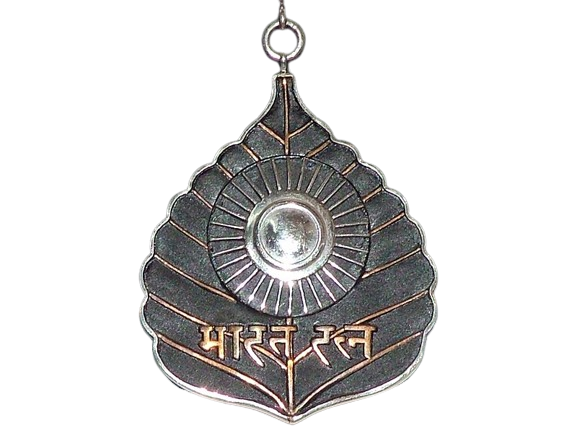Table of Contents

Introduction: National Awards of India
The National Awards of India are prestigious honors given by the Government of India to recognize outstanding achievements and contributions across various fields, including arts, literature, sports, social work, and bravery. These awards not only honor exceptional service and talent but also inspire others to contribute to society in meaningful ways.
Bharat Ratna
- History: Instituted in 1954, it is India’s highest civilian award, initially intended for achievements in arts, literature, science, and public services, though later extended to any exceptional contribution.
- Selection Process:
- Recommendations are made by the Prime Minister to the President.
- There is no specific limit on the number of awards, though typically no more than three are awarded in a year.
- Comes with a medallion and a citation, but there is no monetary grant.
Padma Awards
- History: Also started in 1954, the Padma Awards consist of three levels: Padma Vibhushan, Padma Bhushan, and Padma Shri. They recognize a wide range of contributions to society across arts, education, sports, medicine, social work, and more.
- Selection Process:
- Nominations are open to the public, and anyone can recommend themselves or others.
- A committee under the Ministry of Home Affairs reviews the nominations.
- Recommendations are forwarded to the Prime Minister and President for final approval.
Gallantry Awards
- History: Established after India’s independence in 1947, these awards honor acts of bravery, valor, and sacrifice by members of the Armed Forces, paramilitary, and civilians.
- Types:
- Wartime Gallantry Awards: Include Param Vir Chakra, Maha Vir Chakra, and Vir Chakra.
- Peacetime Gallantry Awards: Include Ashoka Chakra, Kirti Chakra, and Shaurya Chakra.
- Selection Process:
- Recommendations are made by the Armed Forces and reviewed by a committee of senior defense officers.
- Final approval is given by the President of India.
- Recipients are honored during the Republic Day Parade.
National Film Awards
- History: Instituted in 1954 to promote excellence in Indian cinema and honor exceptional talent in the film industry.
- Selection Process:
- Administered by the Directorate of Film Festivals under the Ministry of Information and Broadcasting.
- A national panel of judges, consisting of filmmakers and critics, reviews the submissions.
- Awards are presented by the President of India, with categories including Best Actor, Best Director, and Best Film.
Arjuna Award
- History: Established in 1961 to recognize outstanding performance in sports.
- Selection Process:
- Recommendations are reviewed by a selection committee appointed by the Ministry of Youth Affairs and Sports.
- Performance over the past four years is a key criterion, along with qualities like sportsmanship and discipline.
- Recipients receive a bronze statue of Arjuna, a certificate, and a cash prize.
Dronacharya Award
- History: Launched in 1985, this award is named after the legendary coach Dronacharya from the Mahabharata.
- Selection Process:
- Awarded to coaches based on their athletes’ performance over four years.
- Nominations are reviewed by a committee of sports experts appointed by the Ministry of Youth Affairs and Sports.
- Recipients receive a bronze statue, a certificate, and a cash prize.
Rajiv Gandhi Khel Ratna Award (Now renamed as Major Dhyan Chand Khel Ratna Award)
- History: Instituted in 1991–1992, this is India’s highest sporting honor for achievements at the national and international levels.
- Selection Process:
- A committee of sports experts evaluates athletes’ performances over four years.
- Recommendations are made to the Ministry of Youth Affairs and Sports.
- Recipients receive a medallion, a certificate, and a cash prize.
Major Dhyan Chand Award
- History: Introduced in 2002 to recognize lifetime contributions to sports.
- Selection Process:
- A committee reviews nominees who have retired from sports and contributed to its promotion.
- The award includes a certificate, a bronze statue, and a cash prize.
National Bravery Award
- History: Established in 1957 by the Indian Council for Child Welfare to honor children for exceptional acts of bravery.
- Selection Process:
- Recommendations are received from various states and vetted by a committee of social workers and government officials.
- Awarded to children between 6 and 18 years.
- Winners are honored with a medal and certificate and participate in the Republic Day Parade.
Sahitya Akademi Award
- History: Established in 1954 by the Sahitya Akademi, this award recognizes outstanding literary work in 24 Indian languages.
- Selection Process:
- A panel of literary experts selects the winners based on nominations in each language.
- Award includes a plaque and a cash prize.
Jnanpith Award
- History: Instituted in 1961, it is India’s highest literary award, presented for a lifetime contribution to Indian literature.
- Selection Process:
- Selected by a committee of literary scholars.
- Winners receive a bronze statue of Saraswati, a citation, and a cash prize.
Shanti Swarup Bhatnagar Prize
- History: Instituted in 1958 by the Council of Scientific and Industrial Research (CSIR) to honor outstanding research in science.
- Selection Process:
- Nominations are reviewed by panels of scientists from various fields.
- Winners receive a cash prize, a citation, and a plaque.
Indira Gandhi Prize for Peace, Disarmament, and Development
- History: Established in 1986 in honor of former Prime Minister Indira Gandhi.
- Selection Process:
- Selected by a committee chaired by the President of India.
- Recognizes individuals or organizations contributing to peace and development.
- Winners receive a cash prize and a citation.